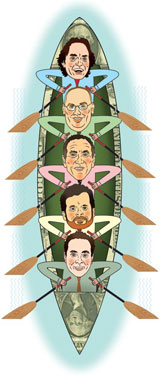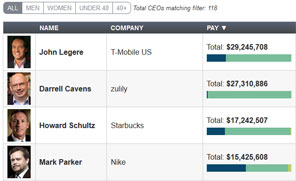Originally published June 21, 2014 at 6:51 PM | Page modified June 21, 2014 at 7:08 PM
Nine-figure pay package tops list for largest U.S. companies
Tharif Souki at Cheniere Energy, a natural-gas distributor, topped the Equilar list and was the only executive to make nine figures last year. He received $141.9 million. Richard C. Adkerson, at Freeport-McMoRan Copper & Gold, made $55.3 million, nearly four times his 2012 pay.
New York Times News Service
Pulling away: 5 highest-paid CEOs
Stock benefits separated the highest-paid executives of Northwest public companies from the rest.

1John Legere, T-Mobile US
2Darrell Cavens, zulily
3Howard Schultz, Starbucks
4Mark Parker,
Nike
5Spencer Rascoff, Zillow
1John Legere — T-Mobile US
2013 total pay: $29.2 million
Cash pay: $6.6 million
Equity pay: $22.5 million
Market cap (12/31): $29.97 billion
Profit FY 2013: $35 million
Number of employees: 40,000
2Darrell Cavens — zulily
2013 total pay: $27.3 million
Cash pay: $350,000
Equity pay: $26.9 million
Market cap (12/31): $5.13 billion
Profit FY 2013: $12.9 million
Number of employees: 1,110
3Howard Schultz — Starbucks
2013 total pay: $17.2 million
Cash pay: $3.7 million
Equity pay: $13.3 million
Market cap (12/31): $59 billion
Profit FY 2013: $8.3 million
Number of employees: 182,000
4Mark Parker — Nike
2013 total pay: $15.4 million
Cash pay: $7.1 million
Equity pay: $7.7 million
Market cap (12/31): $69.3 billion
Profit FY 2013: $2.5 billion
Number of employees: 48,000
5Spencer Rascoff — Zillow
2013 total pay: $10.6 million
Cash pay: $473.570
Equity pay: $10.1 million
Market cap (12/31): $3.2 billion
Loss FY 2013: $12.5 million
Number of employees: 817
Source: Equilar and SEC documents
Illustration: David Miller / The Seattle Times
More
![]()
A 30 percent rise in stocks made 2013 a fruitful year for the owners of U.S. businesses, the shareholders; while the growth in rewards was less generous for top employees, their compensation was still enormous. Average total pay for the 200 most highly paid chief executives tracked by Equilar, an executive compensation data firm, rose 6 percent, to $20.7 million.
If your own income was considerably less than eight figures last year, you may find $20 million in compensation grossly excessive. But changes in the way that CEO pay is determined improved the odds that executives on the list were earning their money, not just extracting it from the corporate coffers.
James F. Reda, a compensation consultant at Arthur J. Gallagher & Co., highlighted trends toward greater independence of the boards that set executives’ pay and an increase in the proportion of pay based on achieving tangible results. For the most part, he said, “A lid is being put on executive pay, even with this tremendous stock performance. That shows that new scrutiny and the independence of the compensation committees put in place in the last five years seems to be working.”
Notwithstanding these changes, some pay packages remained spectacular. Two executives who did conspicuously well last year are Charif Souki at Cheniere Energy, a natural-gas distributor, and Richard C. Adkerson at Freeport-McMoRan Copper & Gold. Souki topped the Equilar list and was the only executive to make nine figures last year. He received $141.9 million, which amounts to more than half of Cheniere’s revenue. Adkerson made $55.3 million, nearly four times his 2012 pay.
Cheniere did not respond to a request for information about Souki’s compensation. It appears from the company’s proxy statement that his huge share award was for meeting targets connected with the construction of “trains,” or facilities for cooling natural gas sufficiently for it to be exported economically, something of a holy grail for the U.S. gas industry.
While the company has never made a profit, Cheniere is understood to be farther along in building its trains than rival companies. Whether this justifies Souki’s immense bonus is a matter of opinion. Evidently the board thinks it is, but a shareholder lawsuit questions the way stock was allocated to Cheniere executives and led the company to postpone its annual meeting from June until September, shows that others disagree.
As for Adkerson, Freeport has revised its compensation policy, which is likely to mean reduced pay in years to come, said Eric Kinneberg, a company spokesman. The company gave Adkerson a large bonus to smooth the transition and to resolve potential issues related to a reorganization of Freeport’s management structure after an acquisition that it made during the year, Kinneberg added.
The big paydays at Cheniere and Freeport may have been one-offs, but some executives have consistently been among the highest-paid executives at U.S. businesses. Some of these notable names, ranked high in this year’s Top 200 survey, include Mario Gabelli, of the Gamco Investors fund-management company, at $85 million; Larry Ellison of the technology-service business Oracle, at $78.4 million; and Leslie Moonves of CBS, at $65.6 million.
The survey, Equilar Top 200 Highest Paid CEO Rankings, focused on publicly owned companies with market values of $1 billion or more that filed proxy statements by May 30. The compensation doled out to the executives took several forms: base salaries, bonuses, stock, options and other cash and noncash perks.
You might expect the head of a fund-management firm to do well for himself after the stock market had a year like 2013, but Gabelli did far better than peers at much larger competitors. For instance, Laurence D. Fink, of BlackRock, the world’s largest asset manager, made $22.9 million, barely more than one-fourth of what Gabelli made, even though BlackRock manages $4.3 trillion, about 90 times as much as Gamco. Gamco offered no comment, but much of Gabelli’s compensation is believed to include fees for running some Gamco portfolios.
Gabelli stands out from his asset-management rivals, but Moonves has plenty of company in his industry. Eight of the 30 most highly paid CEOs run businesses that produce or distribute filmed entertainment or do both, including the four main broadcast television networks.
That’s probably no coincidence. Dana McClintock, a CBS spokesman, pointed to a passage in the company’s proxy statement indicating that senior executives’ pay is based partly on compensation paid at rival entertainment companies and in related industries.
One snippet of data in the Top 200 is noteworthy for how little it changed last year: the proportion of total compensation paid out as stock. It held steady at about 44 percent, even with the run-up in the market and the prominent presence of Internet companies, which have highly valued stocks and not much in the way of profits, near the top of the list.
Three online businesses, Zynga, LinkedIn and TripAdvisor, were among the top 10 in total pay for their chief executives, although bosses at all three collected less in cash than the average among the 200 CEOs. Stock was the primary currency at Zynga. The other two dished out substantial option grants.
Shares are the preferred incentive vehicle at many companies, and Don Mattrick, chief executive of Zynga, got a lot of them. Mattrick, the highest-placed CEO on the top 200 list who is in his first year on the job, earned $57.8 million, about two-thirds of it in stock.
Zynga, which develops games played on social-media websites, continues to run at a loss, but that loss was much smaller last year than in 2012 after the company cut costs. The share price was up about 50 percent in 2013. A Zynga spokeswoman, drawing attention to the company’s proxy statement, pointed out that only a small fraction of the shares granted to Mattrick were included in his 2013 taxable income.
Whether the CEOs in Equilar’s rankings are new at their companies like Mattrick, or veterans like Moonves and Gabelli, the trend in executive pay continues to be up, as stocks keep rising.
“The stock market is driving it,” said Aaron Boyd, director of governance research at Equilar. “If a stock is up 30 percent, and you get an extra $1 million, it isn’t viewed as negatively by investors as if they were losing money.” But he wonders how long the good times will roll.
“Is there a limit, a point where we’ll see numbers level out regardless of how well a company does?” he asked. “As of today we haven’t seen it, but at some point pay will get adjusted. Investors will complain, even though they’re doing well. They’ll say, ‘The level is just so high.’”
| Here are 10 of the highest-paid chief executives in American business. The list comes from the Equilar 200. | ||
| Name | Company | Pay (millions) |
|---|---|---|
| Charif Souki | Cheniere Energy | $141.9 |
| Mario Gabelli | GAMCO Investors | $85 |
| Larry Ellison | Oracle | $78.4 |
| Leslie Moonves | CBS | $65.6 |
| W. Nicholas Howley | TransDigm Group | $64.2 |
| Don Mattrick | Zynga | $57.8 |
| Richard Adkerson | Freeport-McMoRan | $55.3 |
| Jeffrey Weiner | $49.1 | |
| Stephen Kaufer | TripAdvisor | $39 |
| Martine Rothblatt | United Therapeutics | $38.2 |
| Source: New York Times; Equilar | ||
 Four weeks for 99 cents of unlimited digital access to The Seattle Times. Try it now!
Four weeks for 99 cents of unlimited digital access to The Seattle Times. Try it now!





















